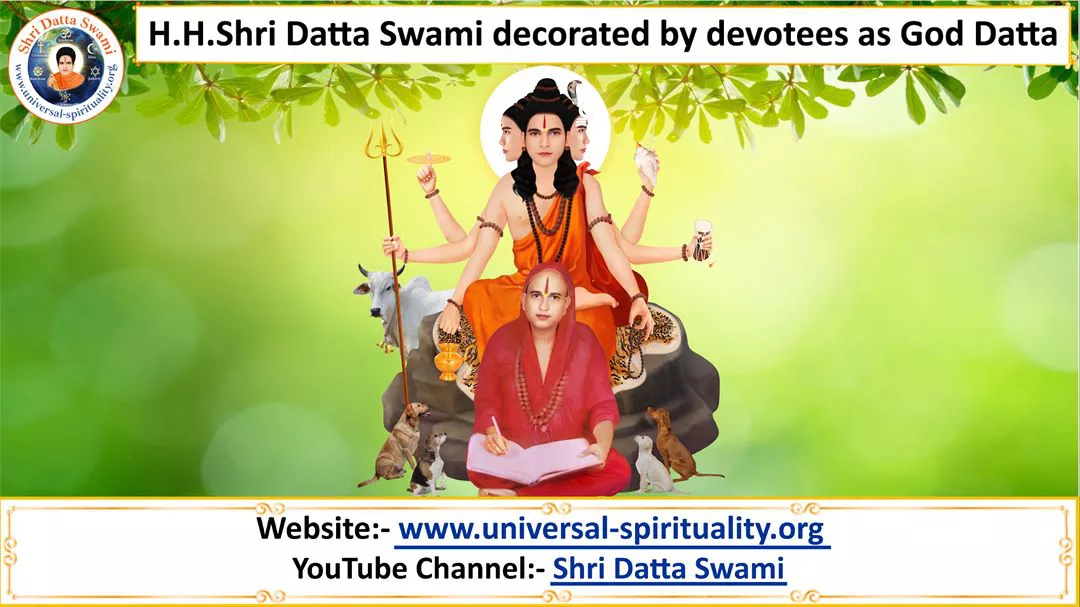
Posted on 25 Aug 2025. Share
[Shri Durgaprasad asked: Paadanamaskaaram Swami, please clarify whether these two Vedic statements mean the same - i) na karmana na prajaya dhanena tyagenaike amrutatva manasuh and ii) Amṛitatvasya tu nāśāsti vitteneti. At Your lotus feet, Durgaprasad]
Swami replied:- The first statement says that you can attain the grace of God (which is immortality by permanently merging in God) by sacrificing the fruit of your work, which is your hard-earned wealth and this is called as Karma Phala Tyaaga, which is very much stressed in the Gita. This is from the angle of the devotee since true love is always proved by the sacrifice of fruit of work. We sacrifice all our earnings to our children only even if they are bad and this proves that we have true love towards our children. Hence, in the case of God also, true love can be proved only by the sacrifice of your hard-earned wealth as per your capacity and as per the extent of your true love to God. This is the basic concept since we see this concept even in the worldly life or Pravrutti also. If you give more property to a specific issue, the entire world will say that you have more love towards that specific issue. Hence, this concept already has the full proof in Pravrutti itself. The second statement says that one cannot purchase God by money. This second Vedic statement belongs to a special case of devotee, who is very proud of his wealth and thinks that he can purchase God like a prostitute with money. This second statement means that you must have full total surrender to God and this concept is attained from theoretical spiritual knowledge and theoretical devotion. If practical devotion is the mango plant that yields the mango fruit, water is the spiritual knowledge and manure is the theoretical devotion. Both these are essential for the mango plant to grow and give fruit. The first statement represents practical Karma Yoga and the second statement represents theoretical Jnaana Yoga and theoretical Bhakti Yoga.

Moreover, the quantity of donation given to God is not important. This means that one cannot purchase God by money. God does not see the quantity of wealth sacrificed for Him. God sees only the percentage of wealth sacrificed to Him compared to the wealth saved for yourself and your family. Jesus told that the one coin offered by a beggar is the real donation with the highest value compared to the hundreds of coins offered by rich devotees because the donation of the beggar is 100%, whereas the other donations were not even 10% of their possessed wealth. When AdiShankara went to a poor house as a beggar, the starving house-lady searched the entire house and gave Him an amla (Indian gooseberry) fruit, which alone was present in her house. This is 100% sacrifice because what all she possessed was sacrificed to God. Pleased with this, AdiShankara prayed Goddess Mahaa Lakshmi, who made a rain of golden amla fruits!
★ ★ ★ ★ ★
Also Read
Correlation Of Vedic Statements
Posted on: 16/12/2022What Is The Meaning Of The Following Statements Of The Bible?
Posted on: 14/08/2023How To Correlate The Following Statements Of You And Jesus?
Posted on: 02/09/2022What Is Your Internal Sense In Your Following Statements?
Posted on: 17/04/2024Which Of The Following Statements Is The Right Way Of Thinking?
Posted on: 26/10/2021
Related Articles
Practical Sacrifice To The Sadguru
Posted on: 25/06/2019Defining Basic Needs And Extra Wealth
Posted on: 19/07/2020Can You Please Give A Clarified Version Of Sacrifice Of Fruit Of Work (karma Phala Tyaga)?
Posted on: 07/08/2022What Is The Relationship Between God And Money? Why Do People Say That Even God Is In Money (paise M
Posted on: 20/07/2020